try with
ReDim vdu(LBound(vd) To UBound(vd) + UBound(vd1), 1 To 1)
For i = LBound(vdu) To UBound(vdu)
If i <= UBound(vd) Then
vdu(i, 1) = vd(i, 1)
Else
vdu(i, 1) = vd1(i - UBound(vd), 1)
End If
Next i
Update for second part of question
I'd convert your merge code into a function
Public Function MergeArrays(arr1 As Variant, arr2 As Variant) As Variant
Dim i As Long
Dim arr As Variant
ReDim arr(LBound(arr1, 1) To UBound(arr1, 1) + UBound(arr2, 1), 1 To 1)
For i = LBound(arr, 1) To UBound(arr, 1)
If i <= UBound(arr1, 1) Then
arr(i, 1) = arr1(i, 1)
Else
arr(i, 1) = arr2(i - UBound(arr1, 1), 1)
End If
Next i
MergeArrays = arr
End Function
And then pass each array to it 1 at a time e.g.
arr = MergeArrays(vd1, vd2)
arr = MergeArrays(arr, vd3)
arr = MergeArrays(arr, vdx)
You could loop through this by storing your arrays in an array or dictionary and looping through that instead as well
Other option
Public Function MergeArrays(ParamArray arrays() As Variant) As Variant
Dim i As Long, j As Long, cnter As Long, UBoundArr As Long, OldUBoundArray As Long
Dim arr() As Variant
For j = LBound(arrays) To UBound(arrays)
UBoundArr = UBoundArr + UBound(arrays(j), 1)
Next j
ReDim arr(1 To UBoundArr, 1 To 1)
For j = LBound(arrays) To UBound(arrays)
For i = LBound(arrays(j)) To UBound(arrays(j))
arr(i + OldUBoundArray, 1) = arrays(j)(i, 1)
Next i
OldUBoundArray = OldUBoundArray + UBound(arrays(j), 1)
Next j
MergeArrays = arr
End Function
This method uses a ParamArray. If you're not sure what that is look it up but effectively you're able to pass an unspecified amount of arguments to the function. Therefore with this function you can combine any amount of arrays (of the same shape and same base i.e. x to x, 1 to 1) and it will combine them. Call like
arr = MergeArrays(vd, vd1, vd2,....,vd18)
